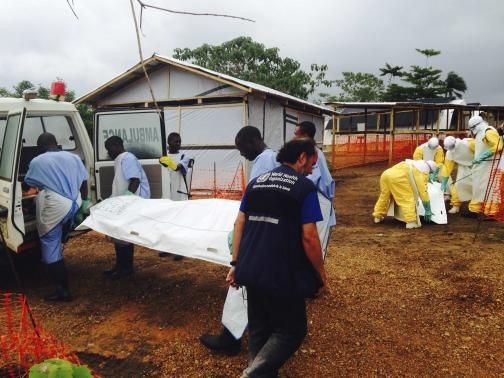Liberia Declares State Of Emergency To Tackle Ebola Outbreak As Death Toll Tops 930

Update as of 5:53 a.m. EDT: Military and police in Sierra Leone have cordoned off rural areas of the country hit by the Ebola outbreak after Liberia declared a state of emergency, Reuters reported Thursday. In the worst-affected parts in Sierra Leone's east, security forces have worked "to establish a complete blockade" in Kenema and Kailahun districts, and installed 16 checkpoints on major roads, the report added.
Liberia, which is one of the worst-affected countries by the ongoing Ebola epidemic, declared a state of emergency on Wednesday to deal with the outbreak.
In a speech declaring the emergency, President Ellen Johnson Sirleaf said that the government will have to implement extraordinary measures for “the very survival of our state and for the protection of the lives of our people.” Sirleaf said that the state of emergency would be in place for at least 90 days, during which the government will institute “extraordinary measures,” including “suspensions of certain rights and privileges.”
“The scope and scale of the epidemic, the virulence and deadliness of the virus now exceed the capacity and statutory responsibility of any one government agency or ministry. The Ebola virus disease, the ramifications and consequences thereof, now constitute and unrest affecting the existence, security, and well-being of the Republic amounting to a clear and present danger,” she said.
The current outbreak, which began in February, is the worst one on record and has reportedly killed more than 930 people and infected more than 1,700 across nations in West Africa, including Guinea, Sierra Leone and Nigeria. In Liberia, 280 people have died and over 500 have been infected by the virus, which has a fatality rate of up to 90 percent.
Ebola, which is a viral hemorrhagic fever, is one of the deadliest diseases known to humans. It is spread through contact with infected blood or the bodily fluids of patients.
The declaration of emergency in Liberia came just a few hours after the World Health Organization, or WHO, kicked-off a two-day meeting over whether to label the Ebola outbreak as a global health emergency. WHO also announced on Wednesday that it would convene a meeting of specialists next week to reach a decision on the approval of ZMapp -- an experimental drug created by the U.S.-based Mapp Biopharmaceutical -- which is being used to treat two Americans infected by the virus while working with patients in Monrovia.
© Copyright IBTimes 2025. All rights reserved.






















